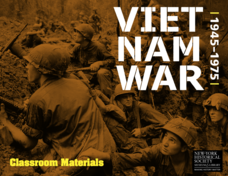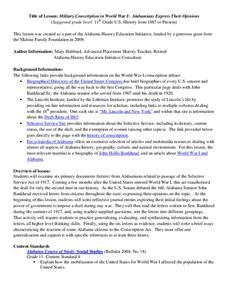National Endowment for the Humanities
The Victor's Virtue: A Cultural History of Sport
Pupils explore the meaning of the ancient Greek word aretê and the place of virtue in historical athletic competition and modern sports. They begin by reading an informational text on the goal of sports in education, and then evaluate...
Anti-Defamation League
Viewing History from Multiple Perspectives
Celebration or protest song? The full text of Woody Guthrie's "This Land is Your Land" opens a study of the Lewis and Clark Expedition, the Louisiana Purchase, and Western Expansion from various perspectives. Middle schoolers examine...
Southern Poverty Law Center
Teaching Hard History: A Framework for Teaching American Slavery
Pupils investigate American slavery from colonial times through the Civil War. They incorporate primary sources, video clips, and firsthand accounts to understand how the slavery issue gripped the nation. Essays, presentations, and...
Community Colleges of Los Angeles
Seeking Refuge: Understanding Refugees in Canada
What if you had no choice but to leave everything behind and seek asylum elsewhere? Do countries have an obligation to accept refugees? To gain an understanding of the complexity of the issues of refugee rights, class members first...
Facing History and Ourselves
The Weimar Republic: Historical Context and Decision Making
Did you know that way before Hitler became a dictator, he actually spent nine months in a German jail? Provide the background for the escalating point before the Nazi party took over in World War II through the exercises in the resource....
Maryland Department of Education
The Concept of Diversity in World Literature Lesson 7: Cultural Commentary
As part of their study of Things Fall Apart, class groups develop a multimedia presentation in response to the question, "In what ways does Achebe use literature as a means to express and comment on culture and history?"
Big Kid Science
Measuring Shadows Using an Ancient Method
How did ancient peoples determine the height of really tall objects? Young scientists and mathematicians explore the concept of using shadows to measure height in a hands-on experiment. Paired pupils measure shadows, then calculate the...
Curated OER
Understanding and Fighting Stereotypes through Words and Images
Use some provocative modern art to get your class considering stereotypes and the impact they have on us all. Your class will discuss the print art Indian Look-Alike by Melanie Yazzie and stereotypes in general before conducting research...
NPR
Partners In Winning The War Lesson Plan
How propaganda was used to change the concept of women's roles during World War II is the focus of an online exhibit provided by the National Women's History Museum. Packed with propaganda posters and pictures, the packet points out how...
New York City Department of Education
Egypt
This six-week unit encompasses all subjects with a focus study on world history and the development of ancient civilizations. As gifted and talented students dive into the interesting yet challenging topic of Egypt, they think critically...
Facing History and Ourselves
Civil Rights Historical Investigations
The murder of Emmett Till, the Selma to Montgomery march, and the desegregation of Boston schools are the focus of three units that ask class members to investigate why these events were so key in the struggle for civil rights. Groups...
Pacific University Oregon
Civil Rights: US History
To gain an understanding of the Civil Rights Movement of the 1960s, class members investigate the Jim Crow Laws, the Emancipation Proclamation, the 13th, 14th, and 15th Amendments of the US Constitution, and the 1898 Supreme Court case,...
Maryland Department of Education
The Concept of Diversity in World Literature Lesson 9: Debating Imperialism
To gain an understanding of Imperialism, class members read Rudyard Kipling's poem, "The White Man's Burden" and Mark Twain's essay, "To the Person Sitting in Darkness." Groups compare these perceptions of non-white cultures with the...
Curated OER
Concepts of Beauty Put Into Words
Studying haiku poetry with your English class? Delving into Japanese history with your world history class? Here is an authentic and creative way to explore Japanese culture more deeply. Pupils will compare and contrast two tea caddies...
Partnership for Educating Colorado Students
Mayan Mathematics and Architecture
Take young scholars on a trip through history with this unit on the mathematics and architecture of the Mayan civilization. Starting with a introduction to their base twenty number system and the symbols they used, this eight-lesson unit...
Anti-Defamation League
Women's Suffrage, Racism, and Intersectionality
The Nineteenth Amendment granted women the right to vote—as long as they were white. High schoolers read articles and essays about racism in the suffrage movement and consider how intersectionality played a role in the movement. Scholars...
New York Historical Society
The Vietnam War: 1945-1975
Do pupils know that the Vietnam War spanned a period of 30 years? A war that long is bound to leave devastating effects. Help young historians develop a comprehensive understanding of the war through multiple units on the subject that...
Smithsonian Institution
Mobilizing Children
Scholars find out how the government used propaganda to mobilize children to help in the war effort. Lesson exercises include analyzing a quote from Franklin Roosevelt, viewing propaganda images and posters, and participating in a lively...
Federal Reserve Bank
Measuring the Great Depression
Young historians examine the cost of goods and services through the Consumer Price Index (CPI), output measured by Gross Domestic Product (GDP), and unemployment measured by the unemployment rate to gain an understanding of the economic...
Alabama Department of Archives and History
Military Conscription in World War I: Alabamians Express Their Opinions
If called, would you go? Should the US government have the power to impose a draft during any war? The Selective Service Act of 1917 (aka the Conscription Act of 1917) authorized the drafting of men into the military for only the second...
State Bar of Texas
Tinker v. Des Moines
Freedom of speech allows anyone, even those in school, to say and do what they feel—right? The 1969 Supreme Court case Tinker v. Des Moines serves as the backdrop for a study on First Amendment rights. Scholars use a short video along...
American Institute of Physics
Women and the Manhattan Project
The Manhattan Project was a massive undertaking involving multiple sites and thousands of scientists and technicians. To gain an understanding of the women who participated in the project, groups select an oral history of a woman...
Curated OER
An Experiment in Alchemy: Copper to Silver to Gold
How exciting would it be for your chemistry class to produce their own "gold"? This experiment allows pupils to witness the chemical reaction of copper pennies as they react with zinc and sodium hydroxide to produce "gold" tokens. It is...
Curated OER
Concept Formation Lesson Plan: Understanding "Protest"
After analyzing both examples and non-examples of a variety of protests conducted by ethnic groups in Seattle and the state of Washington during the twentieth century, your class members will work to identify the key ideas and components...

























